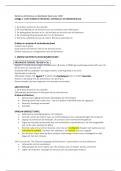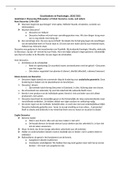The God of Love Would Not Elect A limited Number of People To Salvation
Exclusivism, Inclusivism and Pluralism are three different approaches that express differing
opinions on whether Christianity is compatible with other faiths. The view that all religions
can lead to salvation can be attributed to a pluralist, and to some extent an inclusivist
approach. Thus, this essay will evaluate all three approaches and how they convincingly
argue whether or not an omnibenevolent god elects a limited number of people to be saved.
With this in mind, this essay will corroborate the statement to some degree and argue that a
god of love would not elect a limited number of people to salvation. In this circumstance,
inclusivism is the best approach to take, which acts as a middle ground between exclusivism
and pluralism. Inclusivism states that although salvation comes through Jesus Christ, it is
possible for non-Christians to go to heaven. Moreover this line of argument will include a
variety of scholarly opinions to both corroborate and challenge this stream of thinking.
Exclusivism in Christianity is the belief that only faith in Jesus Christ and the Christian God
can lead to salvation and eternal life. Accordingly, other religions erroneously present false
paths to salvation. This approach is greatly endorsed through the Bible, specifically in John
14:6 whereby Jesus states ‘I am the way and the truth and the life. No one comes to the
Father except through me’ a clear indication that salvation can only be achieved through
Christianity. This simultaneously suggests that God grants limited election to only those who
are of the Christian faith, not from any other world religion. Exclusivist attitudes are often
associated with Calvin and Luther, especially in their strong adherence to human beings as
wholly corrupt and only able to achieve salvation from a free act of grace by God. In
particular, Luther affirmed the doctrine of justification by faith, which argues that good works
are secondary to faith and it is faith that ultimately makes one righteous. Luther’s doctrine of
justification by faith does, however, inherit some challenges, even from the Bible itself.
Matthew 25, also known as the Parable of the Sheep and the Goats demonstrates how
salvation is based on actions, not beliefs, aligning with a more inclusivist approach and
therefore weakening the coherency of Luther’s line of argument.
Many exclusivist attitudes also emphasise the importance of Jesus as God incarnate and so
carrying the authority of the divine. It is from this unique role as mediator between God and
earth that exclusivists assert that it is only through Jesus that one can achieve salvation,
thus again meaning God restricts salvation to those of the Christian faith. The role of the
Church greatly corroborates an exclusivist assertion that Christianity is the only religion that
leads to salvation as they advocate the doctrine of ‘extra ecclesiam nulla salus’, translated
as ‘outside the Church there is no salvation’. This is reinforced in the Catechism of the
Catholic Church, where it is declared that salvation comes from Christ through the Church.
There are fundamental issues that arise with the exclusivist approach. One of the key
attributes of the classical theistic God is his benevolence. Thus, the suggestion that God
condemns people who haven’t heard the Christian message to hell goes against this idea
and presents God as unjust and loving. This line of argument successfully conveys how an
exclusivist approach has fundamental flaws because it is incompatible with the traditional
nature of a benevolent God and rather inclusivism is the better position to take on this matter
as it avoids the inherent weakness within exclusivism that those who have not heard the
Christian message will not achieve salvation.
As aforementioned, inclusivism in Christianity refers to the belief that, although salvation
comes through Jesus Christ, it is possible for other non-Christians to go to heaven. Thus,
Exclusivism, Inclusivism and Pluralism are three different approaches that express differing
opinions on whether Christianity is compatible with other faiths. The view that all religions
can lead to salvation can be attributed to a pluralist, and to some extent an inclusivist
approach. Thus, this essay will evaluate all three approaches and how they convincingly
argue whether or not an omnibenevolent god elects a limited number of people to be saved.
With this in mind, this essay will corroborate the statement to some degree and argue that a
god of love would not elect a limited number of people to salvation. In this circumstance,
inclusivism is the best approach to take, which acts as a middle ground between exclusivism
and pluralism. Inclusivism states that although salvation comes through Jesus Christ, it is
possible for non-Christians to go to heaven. Moreover this line of argument will include a
variety of scholarly opinions to both corroborate and challenge this stream of thinking.
Exclusivism in Christianity is the belief that only faith in Jesus Christ and the Christian God
can lead to salvation and eternal life. Accordingly, other religions erroneously present false
paths to salvation. This approach is greatly endorsed through the Bible, specifically in John
14:6 whereby Jesus states ‘I am the way and the truth and the life. No one comes to the
Father except through me’ a clear indication that salvation can only be achieved through
Christianity. This simultaneously suggests that God grants limited election to only those who
are of the Christian faith, not from any other world religion. Exclusivist attitudes are often
associated with Calvin and Luther, especially in their strong adherence to human beings as
wholly corrupt and only able to achieve salvation from a free act of grace by God. In
particular, Luther affirmed the doctrine of justification by faith, which argues that good works
are secondary to faith and it is faith that ultimately makes one righteous. Luther’s doctrine of
justification by faith does, however, inherit some challenges, even from the Bible itself.
Matthew 25, also known as the Parable of the Sheep and the Goats demonstrates how
salvation is based on actions, not beliefs, aligning with a more inclusivist approach and
therefore weakening the coherency of Luther’s line of argument.
Many exclusivist attitudes also emphasise the importance of Jesus as God incarnate and so
carrying the authority of the divine. It is from this unique role as mediator between God and
earth that exclusivists assert that it is only through Jesus that one can achieve salvation,
thus again meaning God restricts salvation to those of the Christian faith. The role of the
Church greatly corroborates an exclusivist assertion that Christianity is the only religion that
leads to salvation as they advocate the doctrine of ‘extra ecclesiam nulla salus’, translated
as ‘outside the Church there is no salvation’. This is reinforced in the Catechism of the
Catholic Church, where it is declared that salvation comes from Christ through the Church.
There are fundamental issues that arise with the exclusivist approach. One of the key
attributes of the classical theistic God is his benevolence. Thus, the suggestion that God
condemns people who haven’t heard the Christian message to hell goes against this idea
and presents God as unjust and loving. This line of argument successfully conveys how an
exclusivist approach has fundamental flaws because it is incompatible with the traditional
nature of a benevolent God and rather inclusivism is the better position to take on this matter
as it avoids the inherent weakness within exclusivism that those who have not heard the
Christian message will not achieve salvation.
As aforementioned, inclusivism in Christianity refers to the belief that, although salvation
comes through Jesus Christ, it is possible for other non-Christians to go to heaven. Thus,







